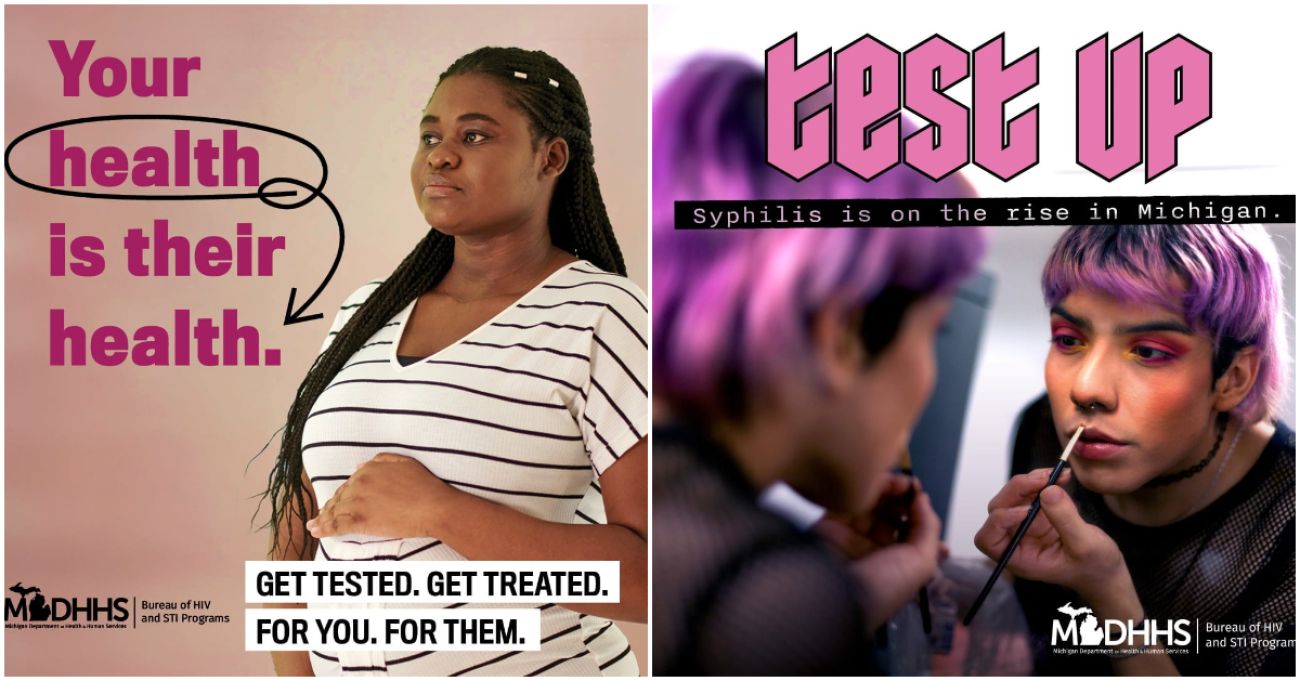Michigan sounds alarm as syphilis spikes among women, infants

- Increases in Michigan syphilis cases mirror a national uptick
- Heterosexual women make up an increasing percentage of cases, putting newborns at risk
- A state campaign urges more awareness, testing
Michigan is stepping up prevention and awareness efforts amid an increase in syphilis, especially among pregnant women.
Among the goals of the Stop Syph campaign are protection for a surprising slice of the state’s population: newborns who contract the infection in the womb.
Mirroring a national trend, cases in Michigan have surged among heterosexual women in recent years. Last year, six babies died in Michigan from congenital syphilis, according to Lynn Sutfin, spokesperson for the Michigan Department of Health and Human Services.
A year earlier, a cluster of syphilis cases in Kalamazoo sent five women to the hospital and caught the attention of federal health officials. The five developed rare complications of syphilis after having sex with the same man.
Related:
- Stressed about the election? Blame human instincts. Here are tips to cope
- Primary-care doctor shortages cut deep in Michigan's underserved areas
- Free COVID tests return in time for Michigan’s respiratory disease season
The Stop Syph campaign urges more testing with a special focus on Michiganders of child-bearing age. Its primary focus will be in Detroit, Kalamazoo, Washtenaw and Genesee counties. hotspots for infection, according to the state.

The multi-media campaign will appear primarily on social media and in posters and flyers in medical clinics.
Here are four things to know about Michigan’s battle with syphilis.
Cases on the rise
Historically, surges in the sexually transmitted infection were associated with men having sex with men. More recently, cases have increased among women, jumping to 757 last year from 217 in 2018 statewide, according to the state health department.
Experts say there are many reasons for the increase:
- Pre-exposure prophylaxis, or PrEP drugs protect people from HIV, but have decreased condom use, leading to more sexually transmitted infections, said Dr. John Brooks, an infectious disease specialist and chair of the Emerging Pathogens Response Team at McLaren Health Care.
- Previous syphilis awareness campaigns focused on men having sex with men, which may have offered false reassurance to heterosexual Michiganders, Brooks said.
- Testing traditionally focused on at-risk populations, likely missing cases and offering a false sense of security for those who didn’t fall into those risk categories, said Chelsea Hinds, a nurse practitioner and clinical trainer at Planned Parenthood of Michigan, which tests and treats sexually transmitted infections.
- A short supply of the the antibiotic Bicillin, last year and earlier this year may have meant some people receive less effective drugs, allowing infections to linger, said McLaren’s Brooks.

Finally, while syphilis for some people causes a host of symptoms — from minor to life-threatening, the infections may cause no symptoms at all in others who therefore go untested, Hinds and others said.
Babies with syphilis
Passed from mother to child during pregnancy, syphilis can cause miscarriage, stillbirth or death shortly after birth.
Last year, Michigan reported 55 total cases of congenital syphilis among infants along with the six deaths. The state had logged just one case per year from 2017 to 2021.
Babies who survive are more likely to have deformed bones, severe anemia, enlarged livers and spleens, brain and nerve problems and meningitis, among other problems, according to the CDC.
Just more than half — 56% of pregnant people on Medicaid — receive proper prenatal screening in their third trimester, according to the state.
A rare cluster
In 2022, a cluster of syphilis among women in southwest Michigan caught the attention of federal health officials.
It began when a woman walked into the Kalamazoo County Health & Community Services Department and “said ‘I think I’m going blind,’” recalled Dr. William Nettleton, the department's medical director and the report's lead author.
Four other women in the area also developed ocular syphilis — a rare development in which the bacteria causes vision problems. The women reported symptoms that ranged from headaches and mild hearing loss to blurred and double vision.
Ocular syphilis is rare enough on its own, Nettleton said.
Rarer still: The women independently named the same sexual partner, a man several of them had met online, according to Nettleton’s report, published as a weekly report by the U.S. Centers for Disease Control and Prevention.
The case is a reminder of the seriousness of syphilis, he said. Each of the five women were hospitalized and otherwise could have faced permanent vision or hearing loss, he said.
“People think of syphilis as a disease of the past — it’s not,” he said.
It’s treatable
If there’s good news about syphilis, it’s that it’s treatable.
Syphilis is usually diagnosed by a blood test, but also can be tested by fluid from a sore or from around the brain and spinal cord.
It’s also curable, especially when found and treated in its early stages. It’s first-line treatment is penicillin, an antibiotic that kills the bacteria that causes syphilis.
Condom use and the medication, Doxycycline post-exposure prophylaxis (Doxy PEP) — taken after sex — can lower the odds of infection. It is recommended for gay, bisexual, and other men who have sex with men and transgender women who are more likely to get bacterial STIs.
Treatment sites can be found at this CDC link here.
See what new members are saying about why they donated to Bridge Michigan:
- “In order for this information to be accurate and unbiased it must be underwritten by its readers, not by special interests.” - Larry S.
- “Not many other media sources report on the topics Bridge does.” - Susan B.
- “Your journalism is outstanding and rare these days.” - Mark S.
If you want to ensure the future of nonpartisan, nonprofit Michigan journalism, please become a member today. You, too, will be asked why you donated and maybe we'll feature your quote next time!





